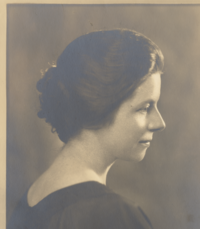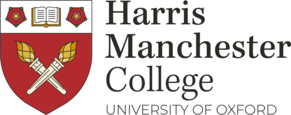Women who made (Harris) Manchester College
We're delighted to be able to reproduce the article written for the Newsletter (September 2020) by the Principal, Professor Jane Shaw, about the life and work of Margaret Brackenbury Crook.
Rev. Margaret Brackenbury Crook (1886-1972)
Minister, women's suffrage campaigner, peace activist and Biblical Scholar
Manchester College came to Oxford in 1889, and by the early twentieth century its student body was strikingly diverse, with male students from India and one of the first Black students to come to Oxford, James Harley (featured in the Class photo of 1907-8 hanging in the corridor outside the Bursary). It was also – unlike other colleges in Oxford at the time – co-educational, admitting women to study and train for the Unitarian ministry.
Margaret Brackenbury Crook was admitted to Manchester College in 1914. She had already been an undergraduate at the Society for Home Students – later known as St Anne’s College – graduating with First Class Honours, though her degree came from the University of London as Oxford did not grant degrees to women until 1920.
Crook came to Manchester College for three years of theological study to prepare for Unitarian ministry. During her time here, she became an activist, initially as a suffragette and, after the outbreak of war, volunteering with the Quakers to attend and monitor court hearings for Conscientious Objectors. In 1916 she went to Northern France to work for the Friends War Relief Committee. Close to the trenches and warfare, she was doing relief work with refugee women and children in a high-risk situation, an experience that shaped her book The Track of the Storm (1917). She managed to juggle all of this with her studies and, in 1917, she received her certificate, coming first in her class at the college.

In 1918, after some difficulties in finding a position because of her gender, she was called to be Minister of the beautiful Octagon Chapel in Norwich, the first woman to be given sole authority of a Unitarian Church. As war ended, so the influenza epidemic began, and her pastoral ministry began in the midst of many deaths from that pandemic. She clearly had an impact in both the church, where she reorganised the Sunday School and made provision for children who had been neglected in the war, and the city, where colleagues urged her to stand for Parliament as a Labour candidate, but she declined saying that she preferred to work in the area of religion.
Two years later, Crook left this thriving ministry, feeling obliged to move to America with her family. Her brother Wilfred married an American woman and settled in New York, and her widowed mother and other brother, Waldo, decided to go too. They sailed out in June 1920. Crook would never work as a minister again: the Unitarian Church in America did not accept her into its fellowship.
Crook now remade herself as a scholar of religion, becoming a professor at the distinguished women’s college in Massachusetts, Smith College. Working first for the
Women’s International League for Peace and Freedom, she travelled extensively to talk about the League’s work – especially to the various East Coast women’s colleges. The President of Smith College heard her speaking and was so impressed that he invited her to join the Department of Religion and Biblical Literature (academic appointments don’t happen quite like this, these days!). She moved to Northampton in 1921, her mother and brother Waldo joining her in her home there, and taught at Smith for the rest of her working life.
Crook’s scholarship was significant in a number of ways. She worked on the Hebrew Scriptures, writing an important book on the Book of Job, The Cruel God (1959). She was also interested in the relationship between the Bible and its Literary associations , teaching an interdisciplinary course on the subject at Smith with various colleagues, and writing a number of essays in this area. And she was a pioneer in feminist study of the Bible. Inspired by her reading of The Feminine Mystique (1963) by Betty Friedan (a familiar figure to those of you who have been watching the recent BBC series Mrs America), she wrote Women and Religion. While the book is not much read now, it was significant for its proposal that a feminist approach could be brought to the whole of Bible.
Crook retired from Smith in 1954, and continued to live in Northampton, Massachusetts, for the rest of her life. But, once retired, she took the opportunity to return to Manchester College, which remained close to her heart, and spent two years here as a visiting lecturer.
Peter Godfrey, now a retired Unitarian minster, was a student at the college during the years when Crook was teaching here, and later went to visit her in the USA. In a short memoir of Crook that he recently wrote for the college archives, he sums her up as follows:
Margaret was a gentle gracious person, with an aura of wisdom. Her lectures, mainly on the Book of Job, were full of interest revealing a wide knowledge not only of the Bible but of ancient literature of Biblical times.
Margaret lived in college full time as did we students for the ministry. This meant that we got to know Margaret personally. Margaret joined us on our walks and very frequently for cups of tea. We found that Margaret was full of interest in our training and in our personal lives. Her thoughtfulness and kindness had a lasting influence on me and, I am sure, on other students. Margaret gave us copies of her book In the Track of the Storm and my copy is still a treasured possession.



